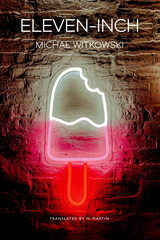

Western Europe, shortly after the fall of the Berlin Wall: Two queer teens from Eastern Europe journey to Vienna, then Zurich, in search of a better life as sex workers. They couldn’t be more different from each other. Milan, aka Dianka, a dreamy, passive naïf from Slovakia, drifts haplessly from one abusive sugar daddy to the next, whereas Michał, a sanguine pleasure-seeker from Poland, quickly masters the selfishness and ruthlessness that allow him to succeed in the wild, capitalist West—all the while taking advantage of the physical endowment for which he is dubbed “Eleven-Inch.” By turns impoverished and flush with their earnings, the two traverse a precarious new world of hustler bars, public toilets, and nights spent sleeping in train stations and parks or in the opulent homes of their wealthy clients. With campy wit and sensuous humor, Michał Witkowski explores in Eleven-Inch the transition from Soviet-style communism to neoliberal capitalism in Europe through the experiences of the most marginalized: destitute queers.

By surveying the present predicament and the current grassroots impulse toward reconsidering the meaning of the continent, Out of One, Many Africas gives shape and momentum to a crucial dialogue aimed at transforming the study of Africa

The Yale Critics was first published in 1983. Minnesota Archive Editions uses digital technology to make long-unavailable books once again accessible, and are published unaltered from the original University of Minnesota Press editions.
A heated debate has been raging in North America in recent years over the form and function of literature. At the center of the fray is a group of critics teaching at Yale University—Harold Bloom, Geoffrey Hartman, Paul de Man, and J. Hillis Miller—whose work can be described in relation to the deconstructive philosophy practiced by French philosopher Jacques Derrida. For over a decade the Yale Critics have aroused controversy; most often they are considered as a group, to be applauded or attacked, rather than as individuals whose ideas merit critical scrutiny. Here a new generation of scholars attempts for the first time a serious, broad assessment of the Yale group. These essays appraise the Yale Critics by exploring their roots, their individual careers, and the issues they introduce.
Wallace Martin's introduction offers a brilliant, compact account of the Yale Critics and of their relation to deconstruction and the deconstruction to two characteristically Anglo-American enterprises; Paul Bove explores the new criticism and Wlad Godzich the reception of Derrida in America. Next come essays giving individual attention to each of the critics: Michael Sprinker on Hartman, Donald Pease on Miller, Stanley Corngold on de Man, and Daniel O'Hara on Bloom. Two essays then illuminate "deconstruction in America" through a return to modern continental philosophy: Donald Marshall on Maurice Blanchot, and Rodolphe Gasche on Martin Heidegger. Finally, Jonathan Arac's afterword brings the volume together and projects a future beyond the Yale Critics.
Throughout, the contributors aim to provide a balanced view of a subject that has most often been treated polemically. While useful as an introduction, The Yale Critics also engages in a serious critical reflection on the uses of the humanities in American today.
READERS
Browse our collection.
PUBLISHERS
See BiblioVault's publisher services.
STUDENT SERVICES
Files for college accessibility offices.
UChicago Accessibility Resources
home | accessibility | search | about | contact us
BiblioVault ® 2001 - 2024
The University of Chicago Press









